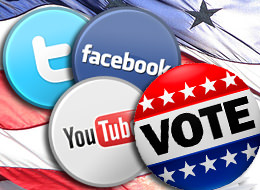Social Media: An Essential Ingredient for Modern Democracy?
Online social platforms experience success in the political realm
@davemorin: The future of political media is social.
By: Ellie Chan, Staff Writer
If the founding fathers of the United States were told that a little bird could start an upheaval and democratize a country, they would never give the idea a thumbs up. Yet, social media is about more than about untagging yourself from photos or following Justin Bieber; it is a revolutionary way to connect and communicate, enabling oppressed voices to be heard. It was true during the Arab uprising, and it is increasingly true for Western governments. Social networks are slowly becoming a building block in the modern face of democracy.
Without doubt, these social platforms do not have any legal power to oust dictators, but they can certainly shake things up by uniting the population together at the speed of a click. In the beginning of 2011, a Tunisian shopkeeper set himself on fire; then, an entire nation rose up because it shared his frustrations and fatigue with authoritarian rule. After Tunisia successfully toppled its dictatorial government, people across North Africa and the Middle East put aside their fears, risked everything, and protested against their own regime.
[pullquote]Muammar Gaddafi, the former autocrat of Libya, banned soccer as the revolution swept into his country. He liked the sport, but feared a stadium gathering… By the time Arab leaders recognized social media as the virtual stadium, it was too late.[/pullquote]
At the height of the Egyptian movement, pictures and videos of the collective power located at Tahrir Square spread like wildfire on the Internet, and quickly gained international awareness and support. When Hosni Mubarak, the Egyptian leader, lost his throne, hope was extended to Algeria, Bahrain, Iraq, Jordan, Libya, Morocco, Oman, Syria, andYemen, sparking a civil war and major demonstrations.
What occurred is written down in history. It is a historical fact that Facebook, Twitter, and Youtube have successfully mobilized people to take action for democracy. These social platforms are not merely tools for communication; they are a multiplier of sentiment, accomplishing goals at a faster rate and on a larger scale.
It was social media that enabled people to i) synchronize their views, ii) coordinate action in a split second, and iii) document and publicize activities. In the light of groups of disconnected and disaffected individuals who seek change but lack the power, social networks are neutral, cheap, and easily accessible spaces where groups with similar opinions can come together. When a solitary person realizes that there are tens, no, hundreds, no, thousands, no, millions of individuals who share the same beliefs, an empowering force is born, one that is feared by governments. After all, politicians are not afraid of opinionated people; they are afraid of a collective group with synchronized views.
Muammar Gaddafi, the former autocrat of Libya, banned soccer as the revolution swept into his country. He liked the sport, but feared a stadium gathering. He would use every measure possible to avoid public gatherings where people could synchronize their beliefs and coordinate their action. By the time Arab leaders recognized social media as the virtual stadium, it was too late.
In 2011, the January 25 demonstration in Cairo was initially coordinated by youth on Facebook. It began with a courageous group of fifty, marching from a mosque in the Mohandiseen neighbourhood. They were outnumbered by the police force. Tweet by tweet, the group grew from 50 to 2,500 to 10,000 strong, protesting at Tahrir Square, engulfing the police. The march did not start as a political movement; many of those who first participated thought it would be another small demonstration. However, what began as a small gathering slowly evolved into a revolution that overthrew a 30-year rule. Today, anyone can coordinate actions within a moment, like the youths in the London riots and the Philadelphia flash mob. For good or for bad, social media made this possible.































Share the post "Social Media: An Essential Ingredient for Modern Democracy?"